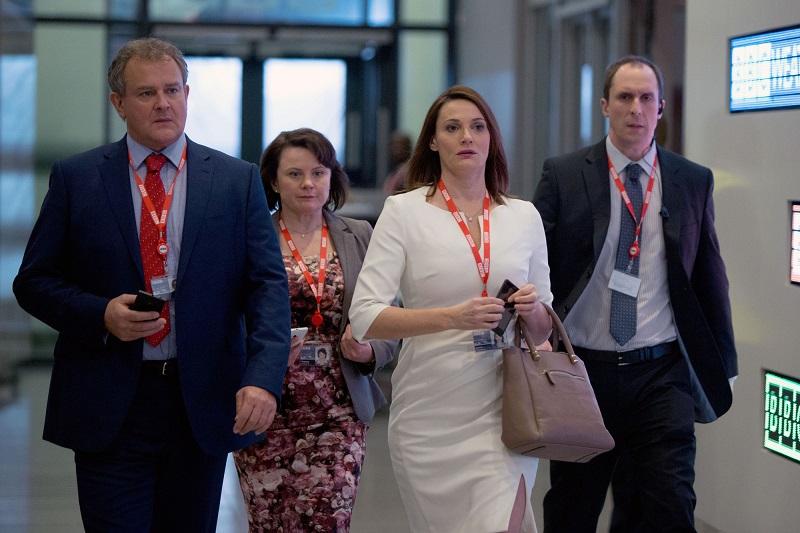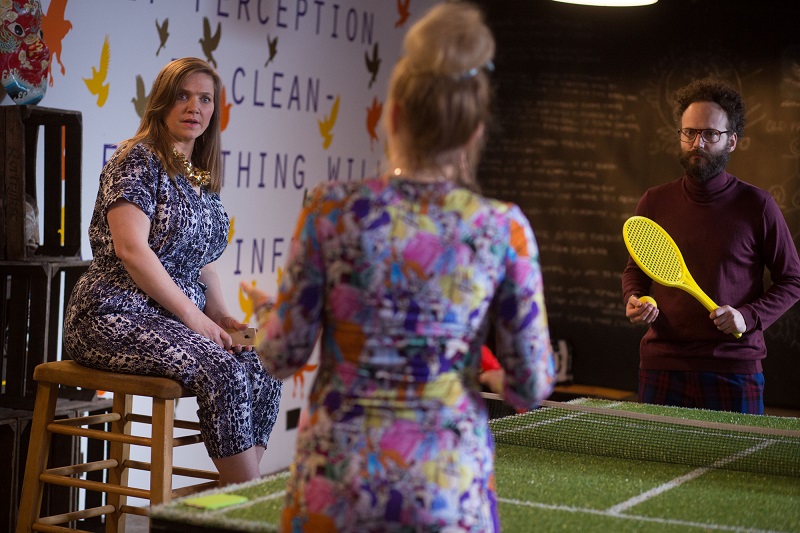W1A, Series 2, BBC Two | reviews, news & interviews
W1A, Series 2, BBC Two
W1A, Series 2, BBC Two
It's still sharp, but should the BBC be flagellating itself a second time?

Should the BBC take the piss out of itself? Of course we must all laugh at our own failings, but the function of satire is to laser in on the faults of others for comedic ends. Isn’t it? The satirist's task is to point the finger elsewhere. Juvenal and Swift and Hislop don’t get up in the morning, look in the mirror and say, “Christ, I’m hilariously bad at what I do. I must tell the world.”
So what are we to make of W1A? John Morton, the great anthropologist of Planet Lanyard, was granted permission to do to the BBC what he had done to the organisation of the London Olympics. But where Twenty Twelve wonderfully tapped into British pessimism and self-loathing, the first series of W1A offered less for the audience to recognise in themselves. We have to live with the BBC, to fund its steepling managerial structure, and the vast severance packages of the people it has carelessly overpaid. And of course we are all still living with the unresolved catastrophe of Savile.
So it’s slightly harder to enjoy the joke that the BBC is overwhelmingly useless on pretty much every level you can imagine. It’s crap at governance. It’s crap at commissioning. It’s crap at decision-making. It’s crap at presentation. It’s crap at empowering talent. It’s crap, in short, at everything. Yes but they’re only joking, aren’t they? Ah but are they? Everyone I ask who works at the BBC finds W1A excruciating because for them it looks like one of those grim workplace documentaries about sewage plants or posh magazines.
The new series opened with an hour-long special. The first half busily reminded us of the catchphrases everyone uses to erect a defensive wall of back-covering consensus (“brilliant”, “fabulous”, “so that’s all good”), and the almost plausible job titles: entertainment format executive, generic head of comedy and/or drama, and (my favourite) the director of better.
 The BBC’s vacuous preoccupation with self-improvement (or as someone put it, striving to be “better than different”) was carefully skewered. Siobhan Sharpe (Jessica Stevenson), the PR executive with a brain fashioned from Play-Doh, was charged with revamping the BBC’s relationship with Wimbledon to appeal to an ethnically diverse demographic (pictured above, Sharpe batting ideas about with her cohorts). The Corporation prepared for a visit to Broadcasting House by the Prince of Wales, triggering the paralysis of the entire building by its syncopatic security software. Meanwhile, a northern dramatist had his entire series concept uprooted to Walthamstow by a meddling exec who asked, all too pertinently, “Who do we want to be telling stories about, and to?”
The BBC’s vacuous preoccupation with self-improvement (or as someone put it, striving to be “better than different”) was carefully skewered. Siobhan Sharpe (Jessica Stevenson), the PR executive with a brain fashioned from Play-Doh, was charged with revamping the BBC’s relationship with Wimbledon to appeal to an ethnically diverse demographic (pictured above, Sharpe batting ideas about with her cohorts). The Corporation prepared for a visit to Broadcasting House by the Prince of Wales, triggering the paralysis of the entire building by its syncopatic security software. Meanwhile, a northern dramatist had his entire series concept uprooted to Walthamstow by a meddling exec who asked, all too pertinently, “Who do we want to be telling stories about, and to?”
The acting, led by Hugh Bonneville as head of values Ian Fletcher, brilliantly conveys the sheer incredulity and bafflement that pervades a much loved organisation which – if W1A is to be believed – contrives continually to put its trousers on back to front, the cart before the horse, and its foot in its mouth. Sarah Parrish and Monica Dolan are a hoot as a pair of cheerless higher-ups, while the delicious Jason Watkins had a quiet episode playing the DG’s henchman as a limp-wristed velociraptor. Sharpest as ever is the voiceover wrily delivered by David Tennant to highlight the kind of breathless documentary the BBC continues to make.
There were no guest celebrities queuing to send themselves up this time, but there was a running gag about a potty-mouthed Jeremy Clarkson, his name creatively beeped out since Tony Hall had to let him go for real. Hall was twitted as someone who gets “into an unnecessary state about his hair”.
As the Olympics in London came ever nearer, Twenty Twelve had a reason to come back for a second helping. It’s huge fun sniggering at the BBC’s venalities, but W1A landed all its blows last time. A second series of comedy glasnost takes self-flagellation too far.
The future of Arts Journalism
You can stop theartsdesk.com closing!
We urgently need financing to survive. Our fundraising drive has thus far raised £49,000 but we need to reach £100,000 or we will be forced to close. Please contribute here: https://gofund.me/c3f6033d
And if you can forward this information to anyone who might assist, we’d be grateful.

Subscribe to theartsdesk.com
Thank you for continuing to read our work on theartsdesk.com. For unlimited access to every article in its entirety, including our archive of more than 15,000 pieces, we're asking for £5 per month or £40 per year. We feel it's a very good deal, and hope you do too.
To take a subscription now simply click here.
And if you're looking for that extra gift for a friend or family member, why not treat them to a theartsdesk.com gift subscription?
more TV
 The Diplomat, Season 3, Netflix review - Ambassador Kate Wyler becomes America's Second Lady
Soapy transatlantic political drama keeps the Special Relationship alive
The Diplomat, Season 3, Netflix review - Ambassador Kate Wyler becomes America's Second Lady
Soapy transatlantic political drama keeps the Special Relationship alive
 The Perfect Neighbor, Netflix review - Florida found-footage documentary is a harrowing watch
Sundance winner chronicles a death that should have been prevented
The Perfect Neighbor, Netflix review - Florida found-footage documentary is a harrowing watch
Sundance winner chronicles a death that should have been prevented
 Murder Before Evensong, Acorn TV review - death comes to the picturesque village of Champton
The Rev Richard Coles's sleuthing cleric hits the screen
Murder Before Evensong, Acorn TV review - death comes to the picturesque village of Champton
The Rev Richard Coles's sleuthing cleric hits the screen
 Black Rabbit, Netflix review - grime and punishment in New York City
Jude Law and Jason Bateman tread the thin line between love and hate
Black Rabbit, Netflix review - grime and punishment in New York City
Jude Law and Jason Bateman tread the thin line between love and hate
 The Hack, ITV review - plodding anatomy of twin UK scandals
Jack Thorne's skill can't disguise the bagginess of his double-headed material
The Hack, ITV review - plodding anatomy of twin UK scandals
Jack Thorne's skill can't disguise the bagginess of his double-headed material
 Slow Horses, Series 5, Apple TV+ review - terror, trauma and impeccable comic timing
Jackson Lamb's band of MI5 misfits continues to fascinate and amuse
Slow Horses, Series 5, Apple TV+ review - terror, trauma and impeccable comic timing
Jackson Lamb's band of MI5 misfits continues to fascinate and amuse
 Coldwater, ITV1 review - horror and black comedy in the Highlands
Superb cast lights up David Ireland's cunning thriller
Coldwater, ITV1 review - horror and black comedy in the Highlands
Superb cast lights up David Ireland's cunning thriller
 Blu-ray: The Sweeney - Series One
Influential and entertaining 1970s police drama, handsomely restored
Blu-ray: The Sweeney - Series One
Influential and entertaining 1970s police drama, handsomely restored
 I Fought the Law, ITVX review - how an 800-year-old law was challenged and changed
Sheridan Smith's raw performance dominates ITV's new docudrama about injustice
I Fought the Law, ITVX review - how an 800-year-old law was challenged and changed
Sheridan Smith's raw performance dominates ITV's new docudrama about injustice
 The Paper, Sky Max review - a spinoff of the US Office worth waiting 20 years for
Perfectly judged recycling of the original's key elements, with a star turn at its heart
The Paper, Sky Max review - a spinoff of the US Office worth waiting 20 years for
Perfectly judged recycling of the original's key elements, with a star turn at its heart
 The Guest, BBC One review - be careful what you wish for
A terrific Eve Myles stars in addictive Welsh mystery
The Guest, BBC One review - be careful what you wish for
A terrific Eve Myles stars in addictive Welsh mystery
 theartsdesk Q&A: Suranne Jones on 'Hostage', power pants and politics
The star and producer talks about taking on the role of Prime Minister, wearing high heels and living in the public eye
theartsdesk Q&A: Suranne Jones on 'Hostage', power pants and politics
The star and producer talks about taking on the role of Prime Minister, wearing high heels and living in the public eye

Add comment